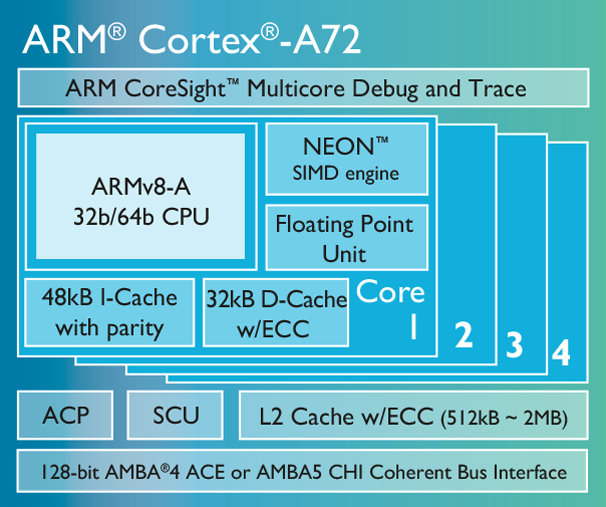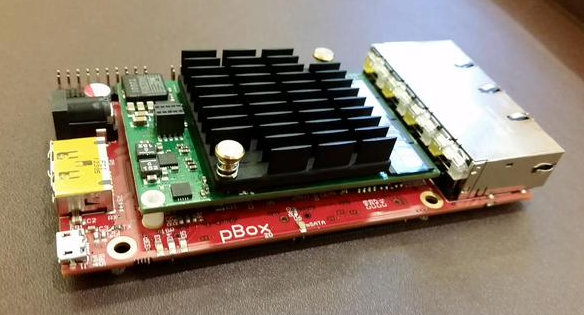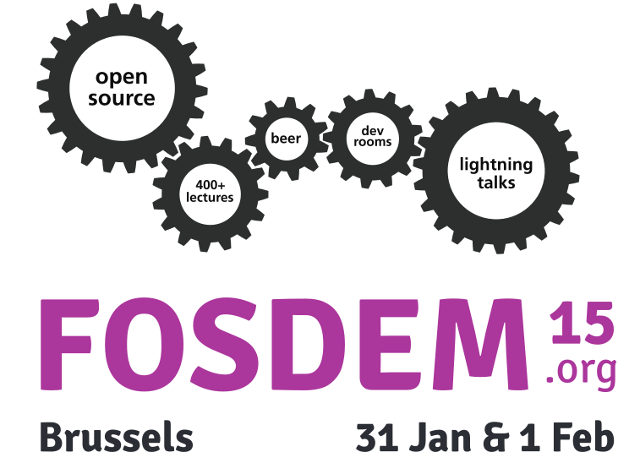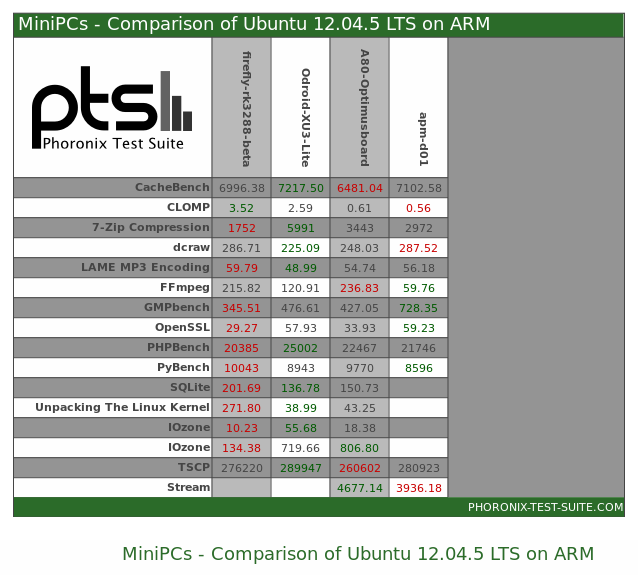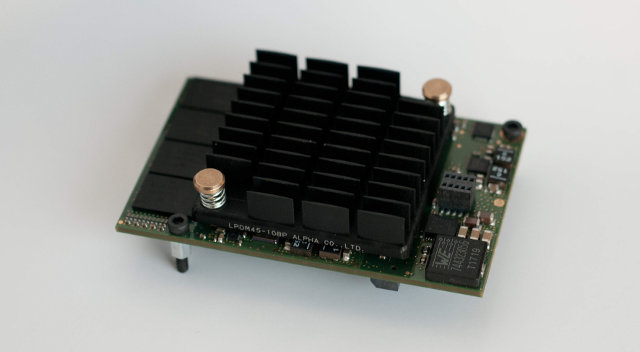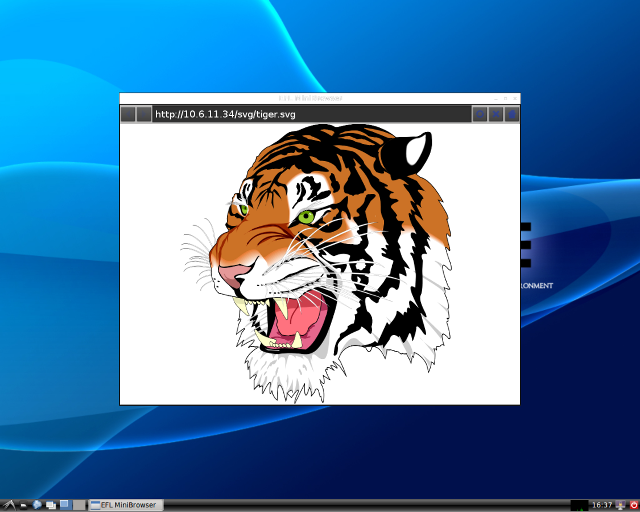ARM has just announced their new Cortex A72 ARMv8 core with 3.5 times the performance of Cortex A15 ARMv7 cores, together with Mali-T880 GPU delivering 1.8 times the performance of Mali-T760, and CoreLink CCI-500 Cache Coherent Interconnect to link the new CPU, GPU and I/Os together. ARM Cortex A72 Some of the key features of the new core include: Architecture – ARMv8-A Multicore – 1-4x SMP within a single processor cluster, and multiple coherent SMP processor clusters through AMBA 5 CHI or AMBA 4 ACE technology ISA Support AArch32 for full backward compatibility with ARMv7 AArch64 for 64-bit support and new architectural features TrustZone security technology NEON Advanced SIMD DSP & SIMD extensions VFPv4 Floating point Hardware virtualization support Cache – 48KB I-cache, 32KB D-cache, and 512 KB to 2MB L2 cache with ECC Debug & Trace – CoreSight DK-A57 Process – 16nm FinFET A cluster can support up to […]
Online Labs pBox (C1 Node) is a mini ARM Server with 4 Gigabit Ethernet Ports, mSATA and mPCIe Slots
Online Labs, a subsidiary of Iliad (free), recently launched hosting services with dedicated ARM servers based on Marvell processor with modules they call C1. The company has decided to design a baseboard (pBox) for C1 module, and, as I understand it, plans to sell it to the public. It’s an exciting development for those who are looking for affordable and tiny purpose built Linux ARM servers. Preliminary C1 Node / pBox mini server specifications (based on C1 specs and bits of information gathered online): SoC – Marvell Armada 370/XP quad core ARMv7 processor @ up to 1.2 GHz System Memory – 2GB RAM Storage – 256 MB NAND flash + mSATA slot + eSATA port + micro SD slot Connectivity – 4x Gigabit Ethernet ports USB – 1x micro USB port Expansion – mini PCie, 1x 20-pin header for expansion (no details yet) Debugging – 20-pin JTAG connector Power Supply […]
FOSDEM 2015 Schedule – January 31 – February 1 2015
FOSDEM (Free and Open Source Software Developers’ European Meeting) takes place every year during the first week-end of February. This year the developer-oriented event expects to bring over 5000 geeks to share ideas and collaborate on open source projects. Contrary to most other events, it’s free to attend, and you don’t even need to register, just show up. FOSDEM 2015 will take place on January 31- February 1 in Brussels. There will be 551 sessions divided into 5 keynotes, 40 lightning talks, 6 certification exams, and with the bulk being developer rooms and main tracks, divided into 7 main tracks this year: Languages, Performance, Time, Typesetting, Hardware, Security and Miscellaneous. I’m not going to attend, but it’s still interested to see what will be talked about, and I’ve concocted my own little virtual program out of the main tracks and developers’ rooms. There’s a few minutes overlap between some talks […]
Linaro Connect Hong Kong 2015 Schedule and Demos
Linaro Connect Hong Kong 2015 will take place on February 9 – 13,2015 in Hong Kong, and the organization has released the schedule for the five days events with keynotes, sessions, and demos. Each day will start with the keynote including speakers such as: George Grey, Linaro CEO, who will welcome attendees to Linaro Connect, and provide an update on the latest Linaro developments Jon Masters, Chief ARM Architect, Redhat, who will present Red Hat update and latest ARMv8-A demonstrations Dejan Milojicic, Senior Researcher & Manager, HP Labs Bob Monkman, Enterprise Segment Marketing Manager, ARM, will discuss about the impact of ARM in next generation cloud and communication network infrastructure Greg Kroah-Hartman, Linux Foundation Fellow, will introduce the Greybus Project (Linux for Project Ara modular phones) Warren Rehman, Android Partner Engineering Manager, Google The agenda also features sessions covering Android, ARMv8-A, Automation & Validation, Digital Home, Enterprise Servers, LAVA, Linux […]
Linux Benchmarks – Rockchip RK3288 vs Exynos 5422 vs AllWinner A80 vs Intel Atom Z3735F
With all these Intel Atom Z3735F been released right now at a price similar to ARM based mini PCs, many people, including myself, are wondering about the performance of the low cost Intel processor against their ARM competitors. Ian Morrison just published some results from Phoronix Test Suite comparing the performance of Firefly-RK3288 (Rockchip RK3288), ODROID-XU3 Lite (Samsung Exynos 5422 BIN2), and A80 OptimusBoard (Allwinner A80) in Linux (Ununtu 12.04.5), against the performance of MeegoPad T01 (Intel Atom Z3735F) running Linux from a Live CD on a USB drive. Some of the benchmarks failed because Phoronix Test Suite got apparently confused with the file systems located on a USB drive, but at least we’ve got a comparison point, and the results are a bit confusing, as they’re no clear winner. In some tests like FFmpeg, the Intel SoC really crushed the ARM competition being at least twice as fast as […]
Iliad’s Online Labs Offers Quad Core ARMv7 Dedicated Servers
Iliad (Free) is a French company known to bring the price of technology down for the masses. Several years ago, they disrupted the Internet broadband market, by bringing low cost triple play broadband services to market, and more recently they entered the mobile market with 2 Euros 3G/4G monthly subscriptions. The company also owns Online.net providing hosting services, and which has recently launched a public preview for Online Labs cloud platform. Most hosted solutions nowadays relies on x86 servers and virtualization, but Online Labs instead features dedicated physical ARM servers connected to SSDs. The company call their custom-made credit-card size server modules C1 boards, completely unrelated to ODROID-C1 boards, as those are powered by a quad core ARMv7 Marvell processor with 2GB RAM, and a 1Gb/s network interfaces. These are then assembled into racks as shown below. And finally 16 racks are inserted into a chassis with a control board, […]
TyGL OpenGL ES 2.0 Backend for WebKit Speeds Up Web Rendering by Up to 11 Times
ARM, Szeged University in Hungary, and Samsung Research UK have been working on TyGL, a new backend for WebKit accelerated with OpenGL ES2.0, and developed and tested on ARM Mali-T628 GPU found in Samsung ARM Chromebook. It will typically provide 1.5 to 4.5 times higher performance, but in the best cases, it can achieve up to eleven times the performance of a CPU-only rendered page. The key features of TyGL include: Web rendering accelerated by GPU – Batching of draw calls delivers better results on GPUs. TyGL groups commands together to avoid frequent state changes while calling the Graphics Context API. Automatic shader generation – TyGL generates complex shaders from multiple shader fragments, and ensures the batches fit into the shader cache of the GPU. Trapezoid based path rendering – Work in progress. It will leverage GPU capabilities such as the Pixel Local Storage extension for OpenGL ES. No software […]
Linaro 14.12 Release with Linux 3.18 and Android 5.0
Linaro usually releases images and source code on the last Thursday of the month, but since most people will have long holidays for Chritsmas and New Year, the last working Thrusday of this month was yesterday (18th). Linaro 14.12 release includes Linux kernel 3.18 (baseline), Linux 3.10.62 & 3.14.26 (LSK, same versions as last month), and Android 5.0.1 Lollipop. Here are the highlights of this release: Linux Linaro 3.18-2014.12 Based on v3.18 release GATOR topic: version 5.20 updated topic from Qualcomm LT (includes IFC6410 board support) updated integration-linaro-vexpress64 topic by ARM LT (FVP Base and Foundation models, and Juno support) updated LLVM topic (uses the community llvmlinux-latest branch) included ILP32 patch set v3 rebased on 3.18. Boot tested with aarch64 userland. Work is in progress to test with aarch64-ilp32 userland. config fragments updated – SELinux related config options enabled in linaro-base.conf, device tree runtime self tests enabled in distribution.conf Linaro […]


